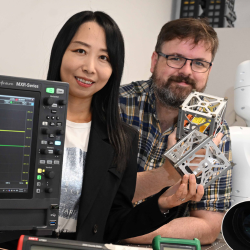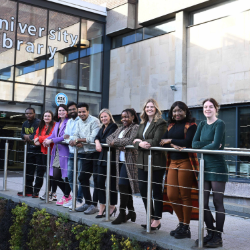-
Study
-
Undergraduate
- Search for a Course
- Undergraduate Open Day & Events
- Application Guides
- Northumbria University UCAS Exhibitions
- Foundation Years
- Undergraduate Fees & Funding
- School & College Outreach
- Continuing Professional Development
-
Postgraduate
- Postgraduate Study Degree
- Postgraduate Research Degrees
- Postgraduate Open Days and Events
- Postgraduate Fees & Funding
- Flexible Learning
- Thinking about a Masters?
- Continuing Professional Development
- Change Direction
-
Student Life
- The Hub - Student Blog
- Accommodation
- Life in Newcastle
- Support for Students
- Careers
- Information for Parents
- Students' Union
- Northumbria Sport
- Be Part of It
-
-
International
International
Northumbria’s global footprint touches every continent across the world, through our global partnerships across 17 institutions in 10 countries, to our 277,000 strong alumni community and 150 recruitment partners – we prepare our students for the challenges of tomorrow. Discover more about how to join Northumbria’s global family or our partnerships.
View our Global Footprint-
Applying to Northumbria
- European Union
- Our London Campus
- Northumbria Pathway
- International Events
- Entry Requirements and Country Representatives
- Regional Offices
-
Northumbria Language Centre
- Faculty Requirements
- Acceptable English Requirements
- Pre-sessional English Language and Study Skills
- Academic Language Skills Programmes (ALS)
-
International Fees, Funding & Scholarships
- International Undergraduate Fees
- International Undergraduate Funding
- International Masters Fees
- International Masters Funding
- International Postgraduate Research Fees
- International Postgraduate Research Funding
- International Money Matters
-
Life at Northumbria
- International student support
- Careers
-
International Mobility
- Current Northumbria Students
- Incoming Exchange Students
-
-
Business
Business
The world is changing faster than ever before. The future is there to be won by organisations who find ways to turn today's possibilities into tomorrows competitive edge. In a connected world, collaboration can be the key to success.
More on our Business Services -
Research
Research
Northumbria is a research-rich, business-focused, professional university with a global reputation for academic quality. We conduct ground-breaking research that is responsive to the science & technology, health & well being, economic and social and arts & cultural needs for the communities
Discover more about our Research -
About Us
-
About Northumbria
- Our Strategy
- Our Staff
- Place and Partnerships
- Student Profiles
- Alumni Profiles
- Leadership & Governance
- Academic Departments
- University Services
- History of Northumbria
- Contact us
- Online Shop
-
-
Alumni
Alumni
Northumbria University is renowned for the calibre of its business-ready graduates. Our alumni network has over 244,000 graduates based in 178 countries worldwide in a range of sectors, our alumni are making a real impact on the world.
Our Alumni - Work For Us
What will I learn on this module?
How can we explain the continued presence of poverty in many parts of the world? How does development happen? What does development actually mean? This module will critically debate theories of development and the roles of key actors including international organisations, the state, transnational civil society, NGOs and local communities. This will include the different and often contrasting and contradictory roles these actors play, and the ways in which this is captured in different approaches to development theory.
The module will begin by examining debates within development theory and the different propositions that were made to overcome the ‘development impasse’ between state and market led approaches, and post-colonial critiques of traditional development theories espoused after World War II (modernisation theory, dependency theory and World Systems Theory). The module then goes on to explore the meaning of development and ideas of Orientalism, before examining the mainstream neoliberal development project. The module will then engage with a range of critical responses to development, including postcolonialism, the work of Amartya Sen and Martha Nussbaum and the capabilities approach; alter-globalization; cosmopolitanism; and feminist approaches to theorising development, as well as alternative theoretical approaches coming from the Global South.
How will I learn on this module?
In this module you will be exposed to contrasting development theories, debates and practices through research-led and research-tutored teaching and learning approaches. The module is delivered in a workshop format to enable an interactive environment. These approaches will enable you to navigate the complex landscape of development theories and to develop critical knowledge of such theories. Discussion of ongoing development debates in the literature forms a key part of the module, and you will show your skills in navigating these debates in tutorial discussions and formative small group work, as well as through the completion of the summative assessments - an annotated bibliography of 1,000 words (which forms 30% of the module mark) and a 3,500-word essay (which forms 70% of the module mark).
How will I be supported academically on this module?
You will receive immediate feedback on formative work during the workshops. Small group work also emphasizes peer-to-peer learning. Module tutors will support your through their topical expertise throughout the module. The interactive environment is designed to enable both peer-to-peer learning and tutor-guided learning, and you will be able to discuss with your tutor specific areas of interest throughout the module.
What will I be expected to read on this module?
All modules at Northumbria include a range of reading materials that students are expected to engage with. Online reading lists (provided after enrolment) give you access to your reading material for your modules. The Library works in partnership with your module tutors to ensure you have access to the material that you need.
What will I be expected to achieve?
1. Develop a critical understanding of key theories of development
2. Evaluate contrasting approaches to development thinking and synthesize information from a variety of sources
Intellectual / Professional skills & abilities:
3. Develop skills in assessing contrasting approaches to development thinking
4. Understand and assess how development theory and practice interact
Personal Values Attributes (Global / Cultural awareness, Ethics, Curiosity) (PVA):
5. Demonstrate an awareness of – and sensitivity to –
different approaches to development across the world
How will I be assessed?
Formative assessment in small group work and small group presentations addresses all MLOs.
Summative assessment comprises an annotated bibliography of 1,000 words (30% of module mark) and a 3,500 word essay (70% of module mark). The annotated bibliography mainly focuses on MLOs 1 and 2, and the essay focuses on MLOs 2, 3, 4 and 5.
Neither of the summative assessments are groupwork.
Feedback on formative work will be provided during class. Feedback for summative work will be provided within the institutionally agreed time frame.
Pre-requisite(s)
N/A
Co-requisite(s)
N/A
Module abstract
Why after 70 years of development aid is there still poverty and growing inequality in Africa, Asia and Latin America? Have we reached the end of development? What does development mean and are there alternative models of development? In this module you will critically debate theories of development and the role of a range of actors, including the World Bank, nation-states, civil society, and local communities.
The module engages staff expertise across the field of development theory. Staff will bring their active research into the classroom, and you will engage with real-life research findings and ideas in development. You will critically explore contemporary development debates and the various ways in which theory and practice influence each other.
The module will develop your analytical and argumentative skills, using several assessment methods. 100% student satisfaction rates with this module in past years reflect the highly interactive, workshop format of the module, which facilitates a high level of student participation, critical reflection and debate. The module will enable you to develop the theoretical and conceptual knowledge sought by international and national development organisations, NGOs and think tanks, and will also prepare you for further academic study at doctoral level.
Course info
Credits 20
Level of Study Postgraduate
Mode of Study 1 year Full Time
3 other options available
Department Geography and Environmental Sciences
Location City Campus, Northumbria University
City Newcastle
Start September 2025
All information is accurate at the time of sharing.
Full time Courses are primarily delivered via on-campus face to face learning but could include elements of online learning. Most courses run as planned and as promoted on our website and via our marketing materials, but if there are any substantial changes (as determined by the Competition and Markets Authority) to a course or there is the potential that course may be withdrawn, we will notify all affected applicants as soon as possible with advice and guidance regarding their options. It is also important to be aware that optional modules listed on course pages may be subject to change depending on uptake numbers each year.
Contact time is subject to increase or decrease in line with possible restrictions imposed by the government or the University in the interest of maintaining the health and safety and wellbeing of students, staff, and visitors if this is deemed necessary in future.
Useful Links
Find out about our distinctive approach at
www.northumbria.ac.uk/exp
Admissions Terms and Conditions
northumbria.ac.uk/terms
Fees and Funding
northumbria.ac.uk/fees
Admissions Policy
northumbria.ac.uk/adpolicy
Admissions Complaints Policy
northumbria.ac.uk/complaints














